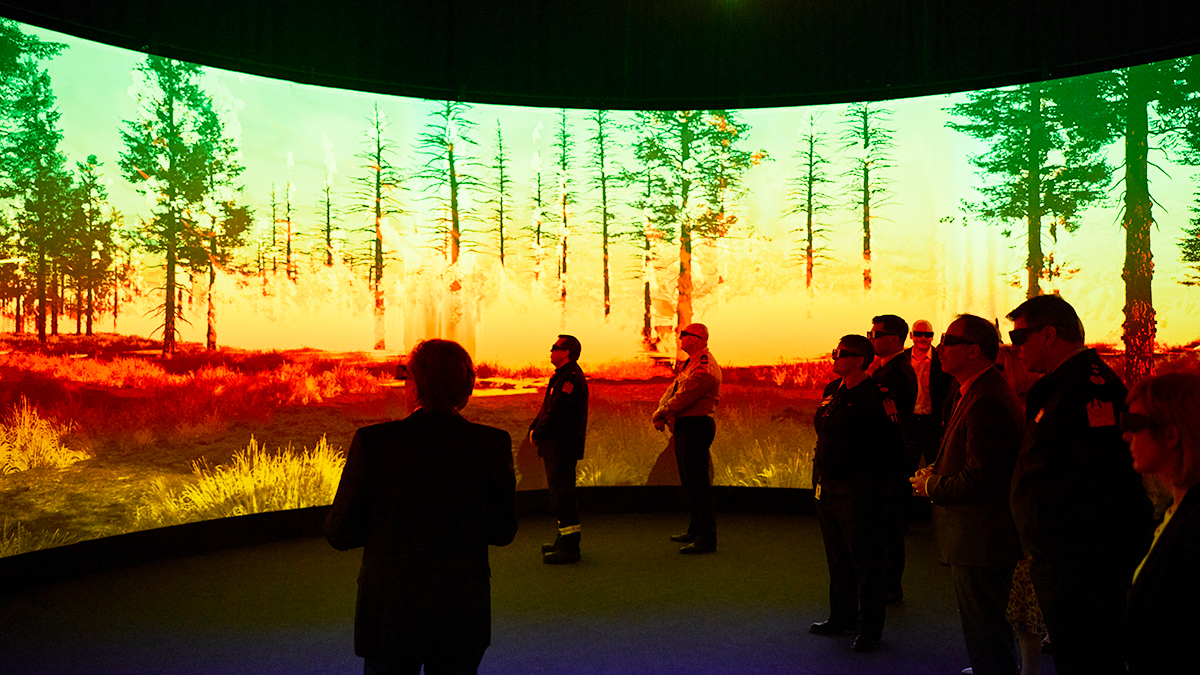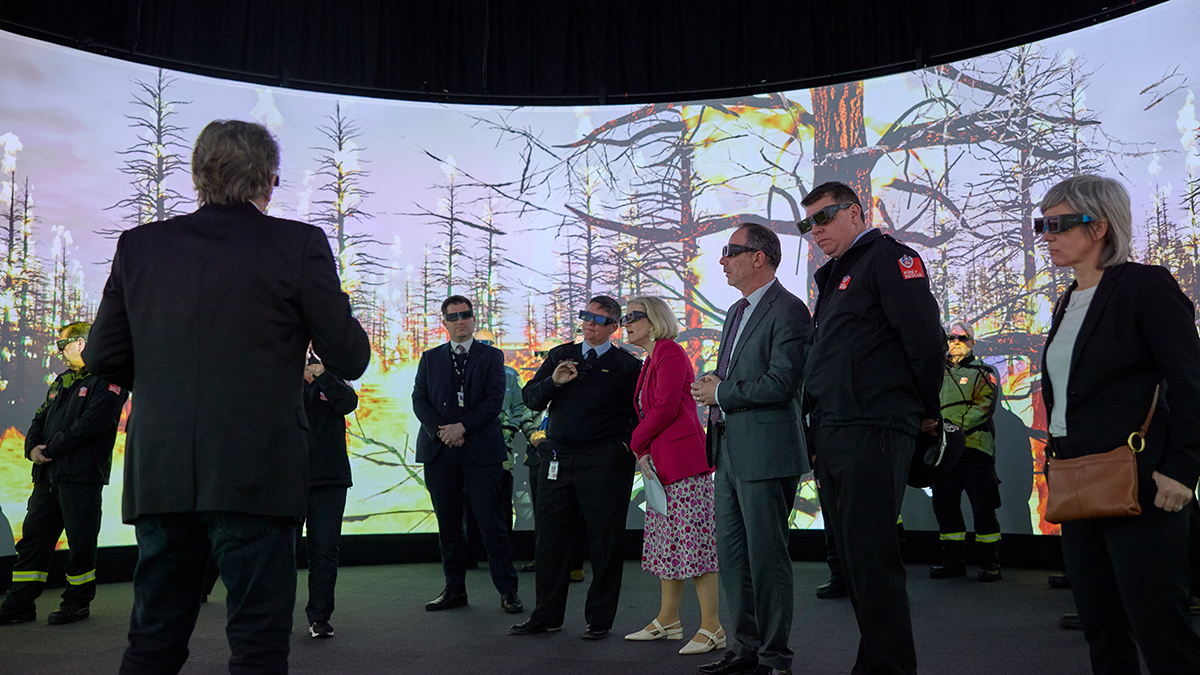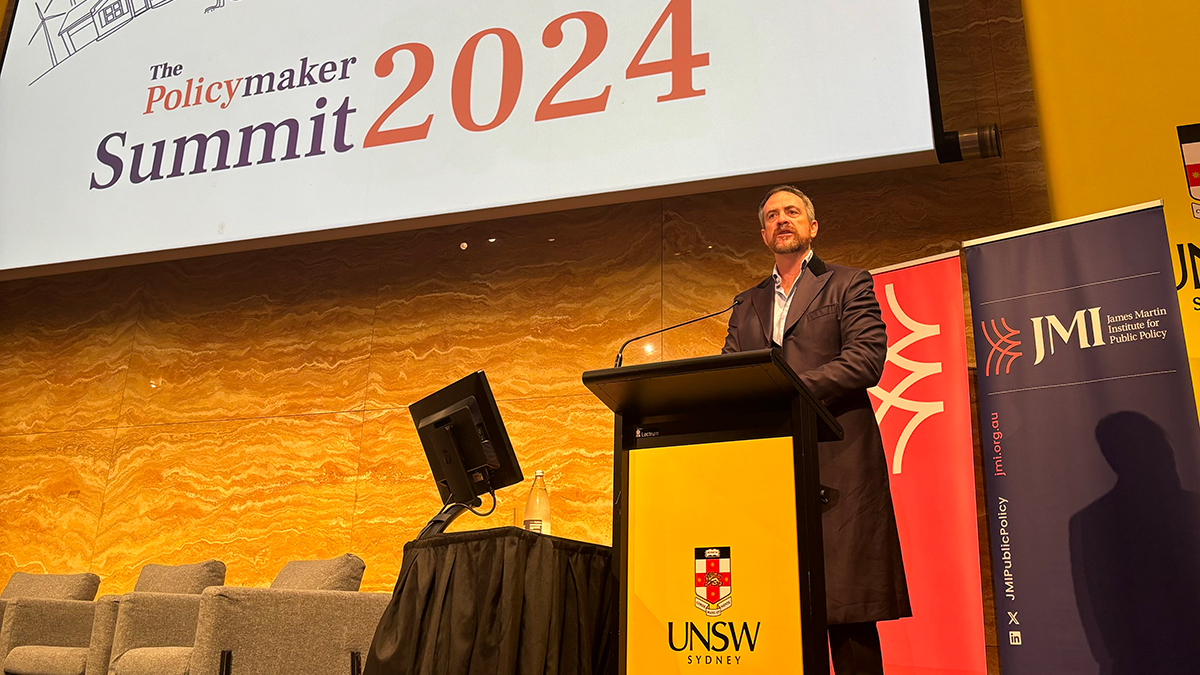
Dear colleagues
As I have talked about in previous newsletters, the role of universities is to serve society. We do this through learning, teaching and research, and through engagement with the world around us and partners who share our vision to improve lives. In this edition of Inside UNSW, there are many reminders of the wonderful collaborations our University has with like-minded partners and the incredible impact these partnerships are creating. From cutting-edge immersive training for NSW’s firefighters, to groundbreaking mRNA vaccine research, our partnerships draw on pooled research, knowledge and expertise to make a real and lasting difference in our local communities and beyond.
Fighting fire with iFire

Last week, I was pleased to host Minister for Emergency Services Jihad Dib and NSW Fire and Rescue Commissioner Jeremy Fewtrell at UNSW. Together, we launched a partnership that will develop cutting-edge immersive disaster simulation and training systems for NSW’s firefighters.
This system, iFire, is a 3D Immersive Cinema that will allow emergency services responders to fully interact in simulated emergency scenarios. We had a demo on Monday of the incredible benefit it will provide for community safety and resilience. It was quite confronting to feel surrounded by a raging bushfire in a very real (but thankfully virtual) sense.
This ADA and broader university partnership is a stellar example of what can be achieved when our universities and government work towards a shared goal. Read more and watch a demonstration of the fire simulation on the UNSW Newsroom.
James Martin Institute for Public Policy

On Friday, UNSW hosted the second James Martin Institute for Public Policy (JMI) Policymaker Summit. UNSW joined JMI in March 2023. It’s a government-university partnership which brings together policymakers and experts from UNSW, University of Sydney, WSU, UTS, Charles Sturt University and the University of Wollongong.
Policymakers have one of the toughest jobs in society. They need to balance competing interests, long and short-term societal needs and hopefully draw upon the latest research and most rigorous evidence to create policies which address issues or progress society. This collaboration enables policymakers to draw on the vast breadth of university research, expertise and networks to inform public policy. Key to success is the unremitting focus on excellence that UNSW brings to our research and knowledge generation endeavours. It also highlights the importance of true engagement and outreach of research efforts, to realise the full potential of academic expertise in addressing the real-world challenges faced by our communities.
UNSW RNA Institute part of $1.8million project to pioneer UTI vaccine
In another excellent example of transformative research collaboration, the UNSW RNA Institute is part of a groundbreaking research project to develop an mRNA vaccine for urinary tract infections (UTIs).
UTIs pose a major health challenge. Millions of people globally are affected each year and the rise of antibiotic-resistant strains of bacteria means new solutions are needed.
An effective vaccine can potentially transform both the prevention and treatment of recurrent UTIs, benefitting millions of people worldwide and easing the healthcare burden associated with these infections.
The $1.8 million MRFF-funded collaboration to develop an mRNA vaccine for UTIs is led by UTS, with other partners including the CSIRO, Garvan Institute of Medical Research, Biointelect, NSW Health and Starpharma. The collaborative nature of the project spans research, manufacturing and clinical trials to rapidly progress interventions. UNSW is proud to be part of this partnership which has the potential to improve lives here in Australia and across the globe. Read more.
Centre for Intellectual Disability driving positive change
Last year, I had the pleasure of being involved in the launch of the National Centre of Excellence in Intellectual Disability Health. Since it was established in October, the Centre has been driving powerful and effective collaborations in intellectual disability health. It brings together people with intellectual disability and their families and carers, health and disability professionals and services, universities, clinicians and advocates, with an aim of improving health services for people with intellectual disability.
The Centre is hosting a conference on Wednesday, 21 and Thursday, 22 August. It will explore topics such as how to embed inclusion in the Centre and in health care more broadly, and the different roles of people and organisations in improving health care for people with intellectual disability. Find out more in this edition of Inside UNSW.
Support services available
International conflicts and devastating human tragedies in spheres around the world continue to have a significant impact on people in our community. Thank you to all in the UNSW community who are supporting our students, colleagues and friends as the loss of life and human suffering are felt keenly by so many. Please continue to build understanding and express compassion, respect and empathy to those around us.
If you need support for your health and wellbeing at this time, please consider making use of the services listed below.
Support for students
- Situation in the Middle East | Mental Health Support
- UNSW Student Support Services
- UNSW Mental Health Connect
Support for staff
I also remind colleagues that UNSW is a member of Scholars at Risk. Please connect with Professor Colin Grant if you would like to know more about this network and its work. Given the increasing need, UNSW is working hard with academics and external organisations on new ways to support refugees and those suffering forced displacement, particularly students. If you would like to be involved or support this work, please contact Professor Bruce Watson, Pro Vice-Chancellor Inclusion in the first instance.
UNSW Strategy – amplifying our societal impact
I wrote in my last newsletter, UNSW Strategy: Progress for All is going to ensure we are the best UNSW we can be, not for our own sake, but for the benefit of others. This is the rationale behind our strategic principle of ‘Ambition for All’.
Another of our four strategic principles is ‘Societal Impact Amplified’. Indeed, positive societal impact has been a feature of our work at UNSW for the past 75 years.
But why ‘amplified’? Well, the idea of ‘amplification’ suggests two things to me.
One. That we take our current drive for societal impact and we concentrate on where, as I’ve said before, UNSW can really ‘turn the dial’. Holding ourselves to account for ensuring we are focusing on those areas where we can have the greatest impact on society, those pressing areas where we have the expertise, the capability and the capacity to create, develop and implement real-world solutions with real-world impact. This is about making a marked increase in the impact we already have. Amplifying our societal impact is an incredibly exciting prospect.
Two. Amplification, to a garage guitarist like me, speaks about being heard. The positive societal impact that drives us at UNSW is proven in a myriad of fields and, as one of the world’s leading universities, we have the opportunity to clearly articulate where and how university education, research and engagement impacts the world around us. Whether it’s transforming lives and livelihoods through increasing educational access and attainment or being on the cutting edge of scientific discoveries that can save lives and the planet, amplifying understanding of our societal impact is vital to encourage others to join us in our journey towards progress for all.
If you would like to share your views and ideas about how our next strategy can help amplify the societal impact of UNSW, please join a consultation session. Thank you to the well over 1500 students and colleagues who have already done so.
I encourage you, too, to join the Staff Town Hall meeting on Monday, 12 August. Professor Verity Firth, VP Societal Impact, Equity & Engagement will provide an update on the UNSW Strategy development and its integral relationship with our Societal Impact Framework.
Education Focussed Retreat goes Beyond the Breakers
Over the weekend I visited our Education Focussed (EF) colleagues in Wollongong, at their annual retreat. UNSW is extraordinarily fortunate to have such a strong and truly excellent EF program and community. I thanked our EF community for all the support they give colleagues across UNSW. It is no wonder the UNSW EF Program is an exemplar not only for universities in Australia but across the world.
They’re a very special community, our EF academics, and I took the opportunity to highlight their wonderful role in the proven, transformative power of education. I was aided in this endeavour by Dr Aunty Joyce Donovan, who in her Welcome to Country described her life starting with being forced from La Perouse to Parramatta Girls Home. Her story was poignant, shocking but incredibly inspirational as to how she had harnessed the transformative power of education. Being a professional educator is a brilliant career, one with immense potential for impact on the lives and livelihoods of our students, as well as the people and communities our graduates go on to affect throughout their lives and careers.

This year’s retreat theme, ‘Beyond the Breakers’, was perfectly aligned to the beachside location and the new strategy, encouraging delegates to take time to look beyond the relentless wave of global changes or challenges that pummel us day to day, towards the future. Critical in our next strategy will be how the University can better and more appropriately create the best environment not only for our EF community but for the entirety of our education and learning aspirations. I also reminded our colleagues to pay special attention to the words of keynote speaker Professor Rob Brander, aka ‘Dr Rip’, should they decide to put the theme into practice off North Wollongong!
Thank you to the EF Team and our more than 540 EF academics for your unwavering focus on excellence in student education.
There’s even more Inside UNSW…
- Congratulations to the winners of the NSW Tall Poppy Science Awards Dr Vipul Agarwal, Dr Thanh Nho Do, Dr Alexandra Jones, Dr Negin Nazarian and A/Professor Simon Rosenbaum.
- I’m pleased to share, UNSW has received a global sustainability impact award for its approach to carbon reduction in support of UNSW’s Net Zero goal. Congratulations to the Estate Management team and everyone involved in achieving this admirable accolade.
- UNSW’s updated Information Governance Policy and Procedure is open for feedback until Thursday 22 August 2024. This initiative is part of the Policy Transformation Program, which aims to streamline and simplify the University’s policy framework.
- This edition’s staff profile features post-doctoral researcher Dr Giulia Silvani, pianist, photographer and biomedical engineer, whose research focuses on tackling the most aggressive type of brain cancer.
Before I sign off, I’d like to remind you that our all-staff Town Hall is this Monday, 12 August from 11am to 12pm. I’ll be joined by members of the University Leadership Team (ULT) for the online forum. We’ll provide updates about vital work at UNSW including our new Strategy and will as always engage in Q&A. Please join us online for the forum.
Best regards
Attila
Professor Attila Brungs
Vice-Chancellor and President
- Log in to post comments
